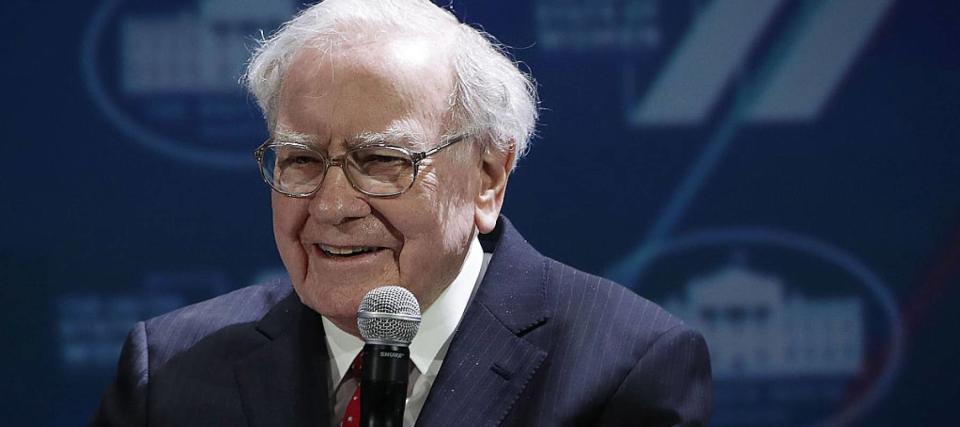'Liquor, ladies and leverage': Warren Buffett — quoting Charlie Munger — said these are the 3 ways you can go broke. Here’s how a 'Dry January' can save you an extra $1,000 in 2024

Warren Buffett may not be your first choice for a wingman on a booze cruise — and for good reason. Neither he nor his late business partner, Charlie Munger, enjoyed a party animal lifestyle.
“My partner Charlie says there [are] only three ways a smart person can go broke: liquor, ladies and leverage,” the Oracle of Omaha said in a CNBC “Squawk Box” interview in 2018.
Buffett isn’t wrong. You can spend anywhere between $57,838 to $121,383 over a lifetime just on alcohol, depending on where you live, according to 2023 data compiled and analyzed by Alcohol.org, an American Addiction Centers resource.
Don’t miss
This Pennsylvania trio bought a $100K abandoned school and turned it into a 31-unit apartment building — how to invest in real estate without all the heavy lifting
Millions of Americans are in massive debt in the face of rising rates. Here's how to take a break from debt this month
Take control of your finances in 2024: 5 money moves to start the new year off strong
New York City inhabitants hit the higher end of the spectrum at more than $121,000, whereas Birmingham, Alabama inhabitants fall on the lower end (roughly $57,000), simply due to these cities’ costs of living.
Based on those numbers, if those living in NYC or Birmingham cut down on their alcohol consumption by 50% or 75%, they’d see an annual savings jump of roughly $534+ and $804+, respectively. But if you stop drinking entirely, they can save between $1,000 and $1,500 per year, according to the same data.
Sure, teetotalling may not turn you into an overnight investing legend, but the savings can help you start stabilizing your finances.
Dry January brings big savings
Some people start their finanicial journey with Dry January, a month-long challenge where you abstain from alcohol after weeks of holiday parties and family gatherings. And it’s not an uncommon New Year’s resolution to have: 15% of Americans engaged in Dry January in 2023, according to a new survey from Business intelligence company Morning Consult.
It’s not just a good cleanse for your body, but also for your wallet. Morning Consult reports that a whopping 73% of Dry January participants in 2023 did so to try and save money. Higher beverage costs has made this a major motivation for survey participants.
Casey McGuire Davidson saw first-hand how much you can save by cutting out drinking for just one month, according to an interview with CNBC. The Seattle-based sobriety coach stopped drinking in 2016 — and saved $500 by the end of her first month. She estimates that she has saved more than $48,000 in the eight years since.
However, if you’re looking for a drinking alternative, mocktails or alcohol-free beer may not be much help. The New York Times reports that many available options are equally as expensive as their booze-infused counterparts because of the high-quality ingredients to make them taste good. So you may need to stick with water or a Coca-Cola the next time you’re out to get the true savings of Dry January.
Read more: Thanks to Jeff Bezos, you can now cash in on prime real estate — without the headache of being a landlord. Here's how
WWWBD (What Would Warren Buffett Do) with your booze savings?
If you complete Dry January and find yourself with extra money left over from your sober-curious month, congratulations! Neither cutting out alcohol nor saving money is an easy feat, so pat yourself on the back.
After that, ask yourself: what would Warren Buffett do with this extra money?
His answer may be similar to what he recommended to the average investor in his 2013 letter Berkshire Hathaway to shareholders: put your money into “a low-cost S&P 500 index fund.”
The 93-year-old believes that most investors have a better chance of making gains by keeping things simple. You can put your money into a low-cost index fund and not have to think about trading individual stocks. Buffett loves these funds because they have diverse ranges of businesses in them, making it likely that their value will grow over the years — all without you having to do anything but invest, sit and wait.
Finding ways to cut costs and investing those savings is a good start to becoming the next Warren Buffett.
What to read next
The US dollar has lost 87% of its purchasing power since 1971: Learn how to diversify your portfolio by investing in the world’s most popular precious metal
Only 20% of Americans are confident they'll have a comfortable retirement — use this 1 magic move to get back on track ASAP (It will only take seconds but most people don't do it.)
Find out how to save up to $820 annually on car insurance and get the best rates possible
This article provides information only and should not be construed as advice. It is provided without warranty of any kind.

 Yahoo Finance
Yahoo Finance 